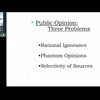showed
Political Double Standards in Reliance on Moral Foundations
Judgment abd Decision Making Abstract Prior research using the Moral Foundations Questionnaire (MFQ) has established that political ideology is associated with self-reported reliance on specific moral f
Social dominance orientation and climate change denial: The role of dominance and system justification
Personality and Individual Differences, Volume 86, pp. 108-111.doi.org/10.1016/j.paid.2015.05.041 Abstract Extending previous research, we examined whether the relation between social dominance orientat
James Fishkin: Is Deliberation an Antidote to Extreme Partisan Polarization? Reflections on “America in One Room”
AbstractIs Deliberation an Antidote to Extreme Partisan Polarization? Reflections on “America in One Room” Register here to join the seminar This talk is positioned at the intersectionof two literatures

James Fishkin: Is Deliberation an Antidote to Extreme Partisan Polarization?
James Fishkin: Is Deliberation an Antidote to Extreme Partisan Polarization? Reflections on “America in One Room” This talk is positioned at the intersectionof two literatures: partisan polarizatio
Denial of anthropogenic climate change: Social dominance orientation helps explain the conservative male effect in Brazil and Sweden
Personality and Individual Differences, Volume 98, Pp. 184-187. doi.org/10.1016/j.paid.2016.04.020 Abstract Political conservatives and males are more likely to deny human influence on climate change. In
Ideology and climate change denial
Personality and Individual Differences, Volume 70, Pages 62-65.doi.org/10.1016/j.paid.2014.06.030 Abstract Examining the relation between ideological variables and climate change denial, we found social
Students’ occupational aspirations: Can family relationships account for differences between immigrant and socioeconomic groups?
Child Development Abstract Immigrant background and disadvantaged socioeconomic background are two key predictors of poorer school achievement in Europe. However, the former is associated with higher wh
Peer acceptance and rejection during secondary school: Do associations with subsequent educational outcomes vary by socioeconomic background?
Child Development Abstract Research shows that peer relationships are associated with students' school adjustment. However, the importance of advantageous and disadvantageous factors for students' educa
Diversity preferences among employees and ethnoracial workplace segregation
Social Science Research. doi.org/10.1016/j.ssresearch.2018.03.009 Abstract Ethno-racial workplace segregation increases already existing ethno-racial inequality. While previous research has identified d
Applying spatial regression to evaluate risk factors for microbiological contamination of urban groundwater sources in Juba, South Sudan
Hydrogeology Journal 25(4) pp. 1077-1091, doi: 10.1007/s10040-016-1504-x Abstract This study developed methodology for statistically assessing groundwater contamination mechanisms. It focused on microbiahumanitarian aid organisation Médecins Sans Frontières in 2010. The factors included hydrogeological settings, land use and socio-economic characteristics. The results showed that the residuals of a conventional probit regression model had a significant positive spatial autocorrelation (Moran’s I =3.05, I-stat = 9.28); therefore, a spatial model was developed that had better goodness-of-fit to the observations. The mostsignificant factor in this model (p-value 0.005) was the distance from a water source to the nearest Tukul area, an area with informal settlements that lack sanitation services. It is thus recommended that future remediation and monitoring efforts in the city be concentrated in such low-income regions. The spatial model differed from the conventional approach: in contrast with the latter case, lowland topography was not significant at the 5% level, as the p-value was 0.074 in the spatial model and 0.040 in the traditional model. This study showed that statistical risk-factor assessments of groundwater contamination need to consider spatial interactions when the water sources are located close to each other. Future studies might further investigate the cut-off distance that reflects spatial autocorrelation. Particularly, these results advise research on urban groundwater quality.








